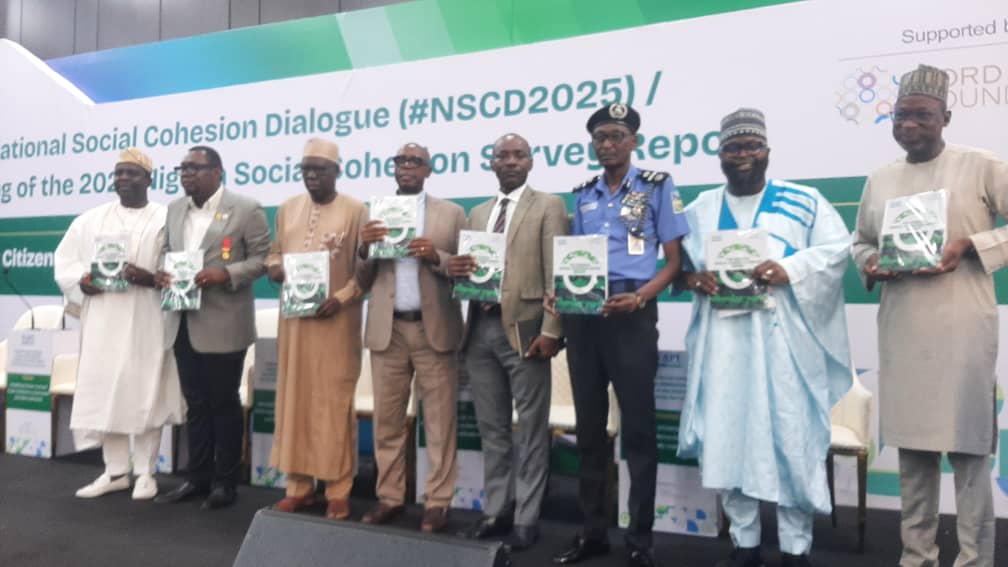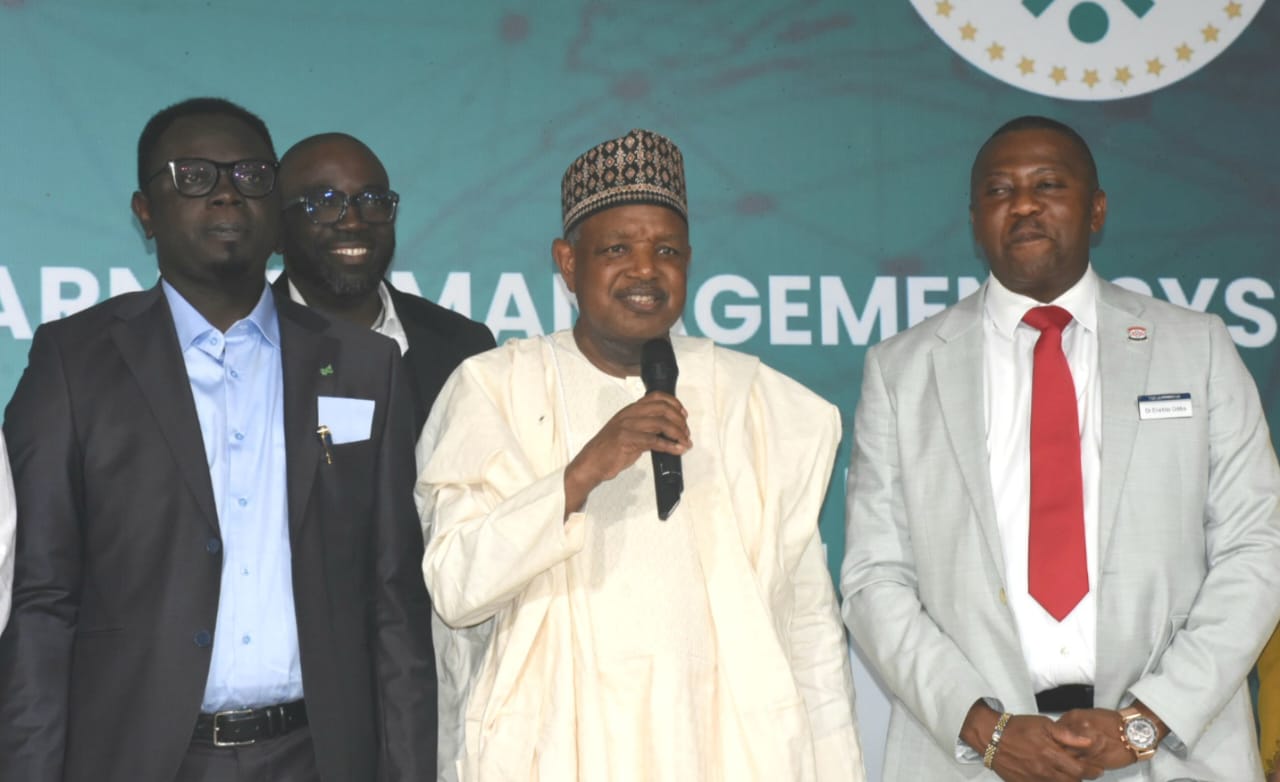Business
API: Citizen’s Trust on President, NASS, Judiciary Others Erodes, As Social Cohesion Index Stalls at 46.8%

Joel Ajayi
Africa Polling Institute (API), an independent, non-profit and non-partisan opinion research think-tank, has released its 2025 Nigeria Social Cohesion Survey report.
The report launched at a national dialogue in Abuja on Thursday, 03 July 2025, has computed the Nigeria Social Cohesion Index (NSCI) as 46.8%. This index is below the average score of 50 percentage points, and indicates a weak state of social cohesion in Nigeria.
The survey findings report growing citizens distrust and low public confidence in the government and public institutions. Specifically, 83% of Nigerians expressed little to no trust in the government of President Bola Ahmed Tinubu; and 82% expressed the same sentiments in the National Assembly under the leadership of Senate President, Dr. Godswill Akpabio and House of Representatives Speaker, Rt. Hon. Tajudeen Abass.
Also, 79% said they have little to no trust in the judiciary, under the leadership of the erstwhile CJN, Justice Kayode Ariwoola, and the current one, Justice Kudirat Kekere-Ekun. In comparison with previous editions (2019, 2021 and 2022), the data reveals that citizens trust and public confidence are currently at their lowest ebb.
In addition, the survey found that Nigerians now seem to be united in shared struggle, especially as it pertains to their everyday lives, and the negative impact of the current economic realities. It is not uncommon to hear citizens constantly alluding to the economic hardship, high costs of transport, and goods and services, as well as the lack of economic prosperity under the “Tinubu economy.”
Africa Polling Institute (API), with the support of Ford Foundation, conducted a nationwide Citizens Perception Survey (CPS) to measure the state of social cohesion in Nigeria, between the months of January and February 2025. A total of 5,465 interviews were completed via Face-to-face Household visits, using the Stratified Random Sampling technique; with citizens aged 15 years and above.
The interviews were conducted in five major languages: English, Pidgin, Hausa, Igbo and Yoruba; and geographic quotas were assigned to ensure that all States and Senatorial District were proportionately represented in the sample.
The concept of social cohesion refers to the willingness of citizens of a country to cooperate and work together towards ensuring the survival and prosperity of the country. Drawing from the literature, and building upon the 2019, 2021, and 2022 rounds of surveys, 14 indicators were instrumentalized to measure social cohesion in Nigeria – Identity; Trust; Social Justice and Equity; Civic Participation; Tolerance; Gender Equity; Disability and Inclusion, Impunity; Corruption; Natural Resource Governance; Polarization; Security and Peacebuilding; Coping Strategies; Migration; Self-worth and Future Expectations. Overall, the results of the 2025 Nigeria Social Cohesion Survey and the Nigeria Social Cohesion Index, was computed at a score of 46.8%, suggesting that Nigeria still falls below the average (50%) threshold of a socially cohesive country. Key Findings from the 2025.
Survey‘Identity’ IndicatorThe survey revealed that 53% of Nigerians “feel disappointed in Nigeria”, compared to 33% who feel truly proud of the country; while 12% feel indifferent. Also, 48% of Nigerians are proud of being equally Nigerian and from their ethnic group; while 27% identify more with their ethnicity than with being Nigerian, compared to only 11% feel more Nigerian than ethnic.
‘Trust Indicator’The survey reported that 83% of Nigerians expressed little to No trust in the government of President Bola Tinubu. Specifically, 53% expressed no trust at all in the administration, while 30% expressed little trust. Similarly, 82% expressed little to no trust in the National Assembly, under the leadership of Senate President, Dr. Godswill Akpabio and House of Representatives Speaker, Rt. Hon. Tajudeen Abass.
Also, 79% expressed little to no trust in the judiciary, under the leadership of the erstwhile CJN, Justice Kayode Ariwoola, and the current one, Justice Kudirat Kekere-Ekun.
‘Civic Participation and Patriotism’ Indicator 68% of citizens are “Extremely or Somewhat Willing” to sacrifice or give up something of interest for the collective good of the nation; 79% are “Extremely or Somewhat Willing” to cooperate with fellow citizens from other ethnic groups to make Nigeria more united; and 76% are “Extremely or Somewhat Willing” to participate in the political process to make Nigeria a better place for all.
Also, 91% expressed their willingness to support inter-ethnic marriages versus 64% who expressed support for inter-religious marriages.‘Corruption’ IndicatorAlmost 6 in 10 citizens (61%) believe that the level of corruption has increased significantly in the past year, while 64% assessed the government’s efforts at tackling corruption “Poorly”. ‘Gender Equity’ Indicator 7 in 10 Nigerians (71%) agrees that women should be allowed to lead in politics, corporate entities and religious organizations; and 73% agree that women should be given equal entitlement to family inheritances.
Another 73% believe women who marry into other states should be allowed to have equal opportunity in their husband’s state. Also, 39% rated government’s effort at promoting gender equity as “Poor”; as against about a third (33%) who rate government “Fair”, and 28% who rated them positively. Furthermore, 63% said they would vote for a Woman as President of Nigeria, 69% would vote a Woman as State Governor, and 76% would vote for a Woman as Local Government Chairperson.
‘Self-Worth and Future Expectation’ IndicatorRegarding self-worth, 59% of Nigerians feel “Extremely or Somewhat Dissatisfied” about their lives as Nigerians right now; while 53% would consider relocating abroad with family members if offered the opportunity. Also, 56% of citizens believe that the future of the country would be much better than it is presently; compared to 26% who expressed pessimism that the future would be much worse.
Recommendations: API reiterates the need for a National Cohesion Commission with the crucial responsibility for ensuring that policies, programmes, and activities of government are targeted at promoting unity and trust, creating a sense of belonging, fostering inclusive governance, providing hope for a brighter future and continuously offering citizens opportunities for upward mobility.
The Federal Government needs to forge a new social contract with Nigerians, one that clearly spells out the benefits of citizenship and the responsibility of the state towards citizens and vice versa.
Unlike Section 2 of Nigeria’s 1999 Constitution, as amended, which enshrines the rights of citizens and affirms the democratic values of human dignity, equality and freedom, yet remains non-justiciable.
The new social contract should be clear seen as putting Nigerians first, not just in words, but also in action. Nigeria is also in need of a new shared vision and national identity, one that emphasizes the country’s uniqueness, its strength in population and diversity; where citizens are all equal before the law and the country works for the good of all. Consequently, institutions such as the Federal Ministry of Information and Culture, National Orientation Agency (NOA), Nigeria Television Authority (NTA), Federal Character Commission and their affiliates have an increasing role to play, in shaping and amplifying narratives that help to promote social cohesion, inclusion and unity.CSOs contributions to social cohesion in Nigeria is imperative and viable because they possess the understanding, capacity and technical know-how to respond to societal issues and facilitate peaceful co-existence of the people which will help to rekindle public trust for civil authorities.
Finally, citizens are encouraged to participate in community dialogues, civil engagements and initiatives that promote cohesion and discuss the type Nigeria they would love to have; especially ideas and insights on how to build a more enduring, prosperous, and egalitarian society.
Business
FG, Investonaire Academy Unveil National Programme to Equip 100,000 Youths with Financial Skills, Digital Wealth Tools

By Joel Ajayi
The Federal Government, in collaboration with Investonaire Academy, has unveiled a nationwide financial literacy and wealth-building programme targeting more than 100,000 young Nigerians. The initiative is designed to equip participants with practical skills in budgeting, saving, investing, asset building, and long-term financial planning, positioning them for sustainable prosperity in a rapidly evolving economy.
Launched on Tuesday in Abuja, the Honourable Minister of Youth Development, Comrade Ayodele Olawande, described financial literacy as a necessary survival tool for young people confronting today’s economic realities.
He noted that the initiative represents the foundation of a broader vision expected to extend beyond Nigeria to other African nations and global markets.
Reaffirming the Federal Government’s commitment to supporting over 4,000 corps members annually, the Minister said the programme will provide platforms, resources, and skills needed for both job creation and employability.
“The young people who understand money — how to save, invest, build assets, and manage risk — are the ones who will lead Nigeria into prosperity,” he said.
A major highlight of the launch was the expansion of the Nigeria Youth Academy, a digital platform offering mentorship, training, and startup support. According to the Minister, more than 200 startups will receive empowerment through the Academy’s e-app platform before the end of the year.
He stressed the need for deeper collaboration with private organisations, innovators, and youth-focused groups, noting that government alone cannot drive youth development. He further encouraged young Nigerians to embrace skills acquisition, innovation, and digital enterprise, saying these remain critical to reducing the desire for migration and increasing self-reliance.
Outlining the Ministry’s long-term commitments, Olawande emphasized three priorities: supporting youth innovation, equipping them with growth tools, and safeguarding millions of Nigerian youths under the Ministry’s mandate.
Speaking at the launch, Sebastien Sicre, Chief Operating Officer of Investonaire Academy, said the programme was crafted to revolutionize the way Nigerian youths learn and apply financial knowledge. He highlighted the Academy’s gamified Learning Management System (LMS), which offers interactive learning tools, community forums, and real-time mentorship to make financial education engaging and accessible.
Complementing the digital platform is a new 200-square-metre physical training centre in Abuja, opposite the NNPC Towers, where in-person workshops and mentorship sessions will take place.
The curriculum covers key global asset classes — including equities, commodities, forex, and indices — ensuring participants gain a broad understanding of financial markets.
Sicre added that with Federal Government backing, the programme seeks to unlock new opportunities, strengthen youth participation in the digital economy, and reward outstanding participants through a $1 million funding pool to support new and existing ventures.
International Programme Director of Investonaire Academy, Dr. Enefola Odiba, explained that the initiative aims to bridge long-standing gaps in financial education among Nigerian youths. While schools teach many subjects, he said, essential financial skills are often missing.
“Many people can earn money — earning money can be easy. The real challenge is retaining, managing, and growing that money,” he noted.
Referencing the Central Bank of Nigeria’s definition of financial literacy, Odiba stated that implementation remains a major national challenge. He said the initiative brings together government agencies, youth groups, academic institutions, and private-sector partners to translate strategy into measurable impact.
The programme’s curriculum covers budgeting, saving, investing, and financial planning — areas where many young people struggle. By offering practical training, real-world insights, and guided mentorship, the initiative aims to build a generation of financially empowered youth capable of driving innovation, entrepreneurship, and sustainable economic growth.
With this partnership, the Federal Government and Investonaire Academy share a common goal: to empower young Nigerians with the financial intelligence and digital tools needed to build wealth, grow businesses, and transform the nation’s economic future.
-

 Featured6 years ago
Featured6 years agoLampard Names New Chelsea Manager
-

 Featured6 years ago
Featured6 years agoFG To Extends Lockdown In FCT, Lagos Ogun states For 7days
-

 Featured6 years ago
Featured6 years agoChildren Custody: Court Adjourns Mike Ezuruonye, Wife’s Case To April 7
-

 Featured6 years ago
Featured6 years agoNYSC Dismisses Report Of DG’s Plan To Islamize Benue Orientation Camp
-

 Featured4 years ago
Featured4 years agoTransfer Saga: How Mikel Obi Refused to compensate me After I Linked Him Worth $4m Deal In Kuwait SC – Okafor
-
Sports3 years ago
TINUBU LAMBAST DELE MOMODU
-

 News11 months ago
News11 months agoZulu to Super Eagles B team, President Tinubu is happy with you
-
Featured6 years ago
Board urges FG to establish one-stop rehabilitation centres in 6 geopolitical zones
